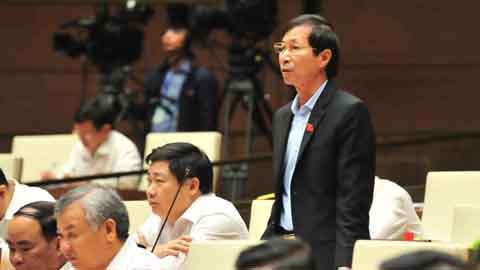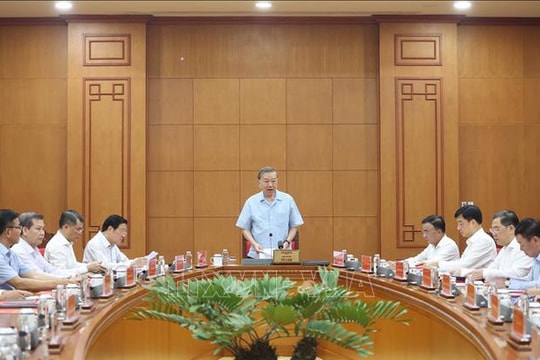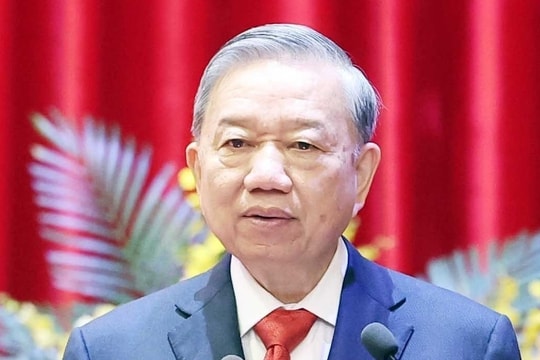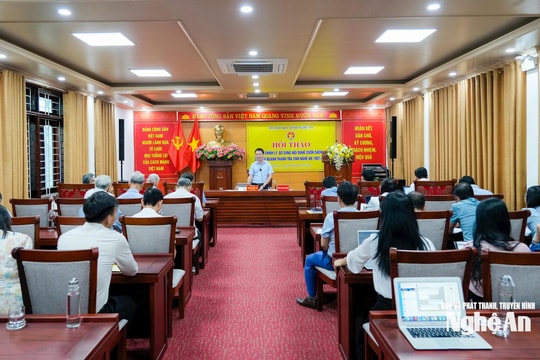Mansions, huge assets and officials' income
Official figures from state agencies on the rate of asset recovery from corruption cases are too low due to the weakness of income control.
The Draft Law on Amendments and Supplements to the Law on Anti-Corruption in 2005, which has just been discussed by the National Assembly, has attracted great attention from society. A particularly important content in it is the issue of controlling public officials' assets. However, this still seems to be a huge challenge for legislators when recently, the mansions of officials are still "standing tall" after inspections and checks by competent authorities.
The rate of asset recovery from corruption cases is too low. This result is due to the weakness of asset control of people with positions and powers.
According to statistics publicly announced by the authorities, the number of declarations verified and concluded to be dishonest is only a few parts per million, showing that the assessment that current asset declaration is still heavily formalistic is completely correct.
 |
| The National Assembly discussed the revised Anti-Corruption Bill in the hall on November 21, 2017. Photo: Minh Dat |
What the authorities are trying to do is still focus on the number of declarations, and the deadline for declarations... Therefore, reports often give impressive figures, for example, 100% of ministries and local branches have declared correctly, fully and promptly. The crucial issue in preventing/fighting corruption is the honesty in declarations, which is still almost uncontrolled.
In reality, we have only discussed a lot about controlling the declaration of assets and income of officials and civil servants, but have not paid much attention to controlling the assets of these people. There are still almost no measures to ensure that declaration helps the state and society control the assets as well as the fluctuations in assets of officials and civil servants in order to detect signs of ambiguity in order to have measures to prevent the dissipation and finally to be able to recover assets of corrupt origin.
Widely declared objects
According to current law, the subjects required to declare their assets and income are leaders from the deputy head of the district level and above and some positions considered to be at risk of corruption, which is up to more than one million people. This is an excessively large and unnecessary number.
Because in theory, anyone in a position of power is at risk of corruption and must be controlled. But that does not mean that everyone needs to and can be controlled.
Let's take a specific subject, the principals of public schools, to consider and we will see. For large cities and urban areas, where the situation of running for schools, running for classes, extra teaching and extra learning is common, it is advisable to declare the assets of school leaders and managers. But on the contrary, for a principal in a remote area, where teachers have to share every little salary for the students' meals, have to wade through mud into each village to persuade the children to come to class, we will see how unreasonable it is to force them to declare their assets and income!
So the first thing to do is to narrow down the subjects of declaration appropriately, with focus and key points in accordance with the spirit of the 3rd Central Resolution according to the motto: "top first, bottom later", "inside first, outside later".
However, it is necessary to ensure that once a declaration is made, it can be controlled for its truthfulness and accuracy.
Comprehensive, long-term solutions
There is a huge loophole that we all see in the current regulatory system: those who are obliged to declare only have to declare their assets, their spouses and their minor children. So the transfer of illegal assets of officials to others, first of all their minor children, relatives, even their mistresses and mistresses, as a National Assembly delegate worried, is like the image of “there is an elephant in the room”!
Even if a general in the National Assembly proposed forcing civil servants to declare their assets for three generations, those with assets can still ask someone outside their family to register their assets, and the law will be powerless to do so. Not to mention that it is not easy for civil servants to force their relatives, who are adults and not financially dependent, to declare their assets to the authorities.
Therefore, to control the assets of public officials, there must be comprehensive measures, from anti-money laundering to managing the movement of assets and money, meaning controlling both the departure and arrival points, controlling both public officials and the whole society through management tools (taxes, property registration, payment through accounts, etc.).
These measures require synchronization, time and technical infrastructure conditions, and cannot rely solely on the provisions of the Law on Anti-Corruption.
Income - the uncontrolled issue
Unlike most countries in the world where income is synonymous with salary, in Vietnam, civil servant salary is only a part of income.
With the highest salary in our country today, anyone with valuable assets can be questioned. For many people, salary is only a small part of total income. For example, going to meetings, going to the locality will have envelopes. Roughly calculated, the departmental leaders of a large city, on average, have about 40 meetings/month. In addition, there are many other sources of income.
In addition, there are other incomes from seniority, professional allowances, deductions from revenues (taxes, customs, inspection and handling of violations...) used in the form of increased income or bonuses on holidays, New Year... All of these incomes are rarely shown in the monthly payroll.
Furthermore, looking at the real estate market, the stock market and other fields, there is also the participation of civil servants for profit, but there is still almost no control.
Thus, the solution to income transparency should be to strictly control the income of civil servants, all expenditures for civil servants from the budget must be transferred. Other income from participating in business, contributing capital, buying and selling real estate, stocks, etc. need to be managed by the tax authority.
Only when we control the source of income (input) can we talk about effectively controlling the assets of public officials.
According to VNN
| RELATED NEWS |
|---|








